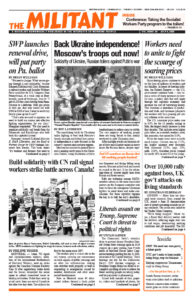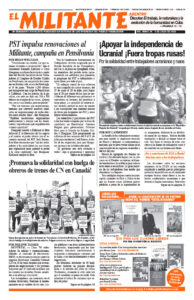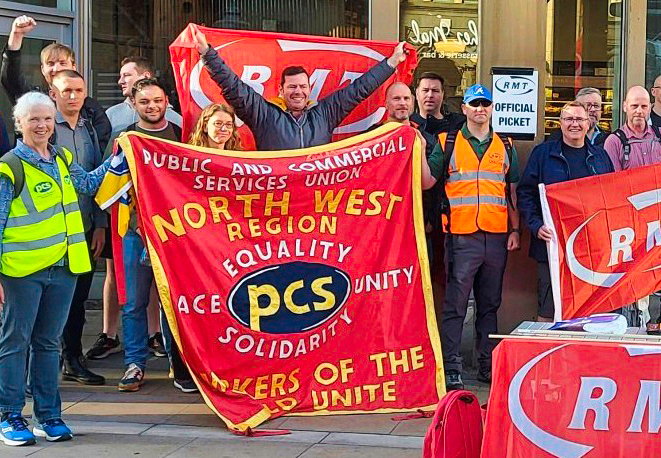LONDON — More than ten thousand trade unionists from around the U.K. joined a June 18 demonstration here to protest mounting assaults on living standards. The action was called by the Trades Union Congress.
“We’re being mugged,” Mesol Sapie, a Royal Mail delivery worker, told the Militant, reflecting anger over cuts to real wages, deteriorating working conditions and job insecurity. The Edinburgh postal worker is one of 115,000 members of the Communication Workers Union set to ballot over strike action in response to the bosses’ insulting 2% wage offer.
Demonstrators cheered as a contingent of hundreds of members of the Rail, Maritime and Transport Workers union entered Parliament Square. Forty thousand RMT members are taking three days of strike action this week to demand better pay and oppose job cuts. Network Rail, the lead company of the 14 being struck, has offered a 2% wage raise, plus two further increases of 0.5% conditional on increased “productivity.” A separate one-day stoppage by RMT members on the London Underground will coincide with the national action.
A contingent of train cleaners employed by contract company Churchill joined the march. Since April 27 they have been taking days of strike action to demand 15 pounds an hour ($18.40) and sick pay. Most are on the national minimum hourly wage of 9.50 pounds. “We went straight from our picket line to the demonstration,” strike leader Rositsa Tomova told the Militant.
Labour Party leader Keir Starmer joined the government and employers in opposing the national rail strike. Transport Minister Grant Shapps has tried to undermine support for rail workers. “The RMT is punishing millions of innocent people,” he said, from students “to people trying to get to hospitals.”
But marchers were not buying Shapps’ argument. “Nurses support the rail strikes,” read a large handmade banner carried by members of the Royal College of Nursing.
“We’ve come to bring solidarity to rail workers and all others fighting for wage rises,” said Gary Walker, Unite convener at Chep in Manchester where pallet workers recently struck for 19 weeks and won a 9% pay raise. Fourteen Chep workers joined the demonstration.
Measured by the government’s consumer price index, inflation is over 9%. For most workers the impact of rising prices is greater still. Real wages have declined since the 2008 financial crisis.
Women workers have been hit hard, earning 15% less than men on average. And women are disproportionately hired on zero-hours contracts that have no guaranteed income and cover over 1 million workers today. The government crows that employment is up since the end of the pandemic, but the labor force participation rate — a measure of the numbers employed and actively looking for work — was just 63.1% in March, a reflection of the growing numbers who have given up looking for work.
“Insecure work is endemic in modern Britain,” TUC General Secretary Frances O’Grady told demonstrators.
“Cuts in real pay, unsociable shift working hours and job insecurity are having a devastating impact on workers’ families,” said rail worker and Communist League leader Pete Clifford, who was marching in the RMT contingent. Well-known as a union activist at Manchester Piccadilly station, Clifford has just won back his job as a train dispatcher after a union-led campaign stood up to bosses’ attempts to fire him. “That victory showed what is possible when union members stand together,” he said.
“The unions have to answer the rulers’ attacks through united action and lead workers to fight for automatic increases in every contract to protect wages against inflation. We need a cut in hours with no loss of pay to create jobs. Union bargaining should cover all workers — permanent and agency, full time and part time.
“Workers need to build our own party,” Clifford said, “a party of labor that will fight in the political arena in the interests of all working people — at home and abroad.”


